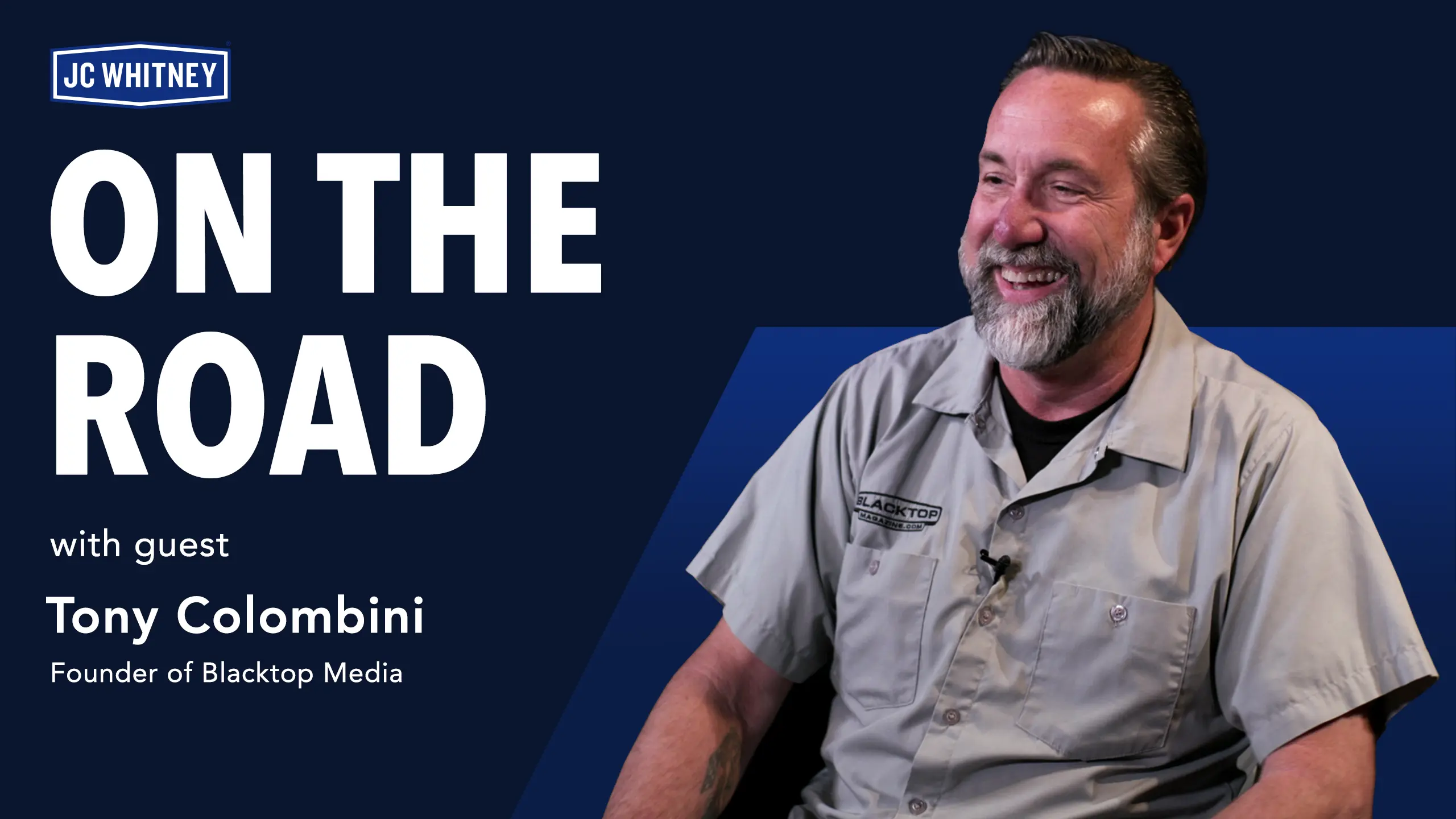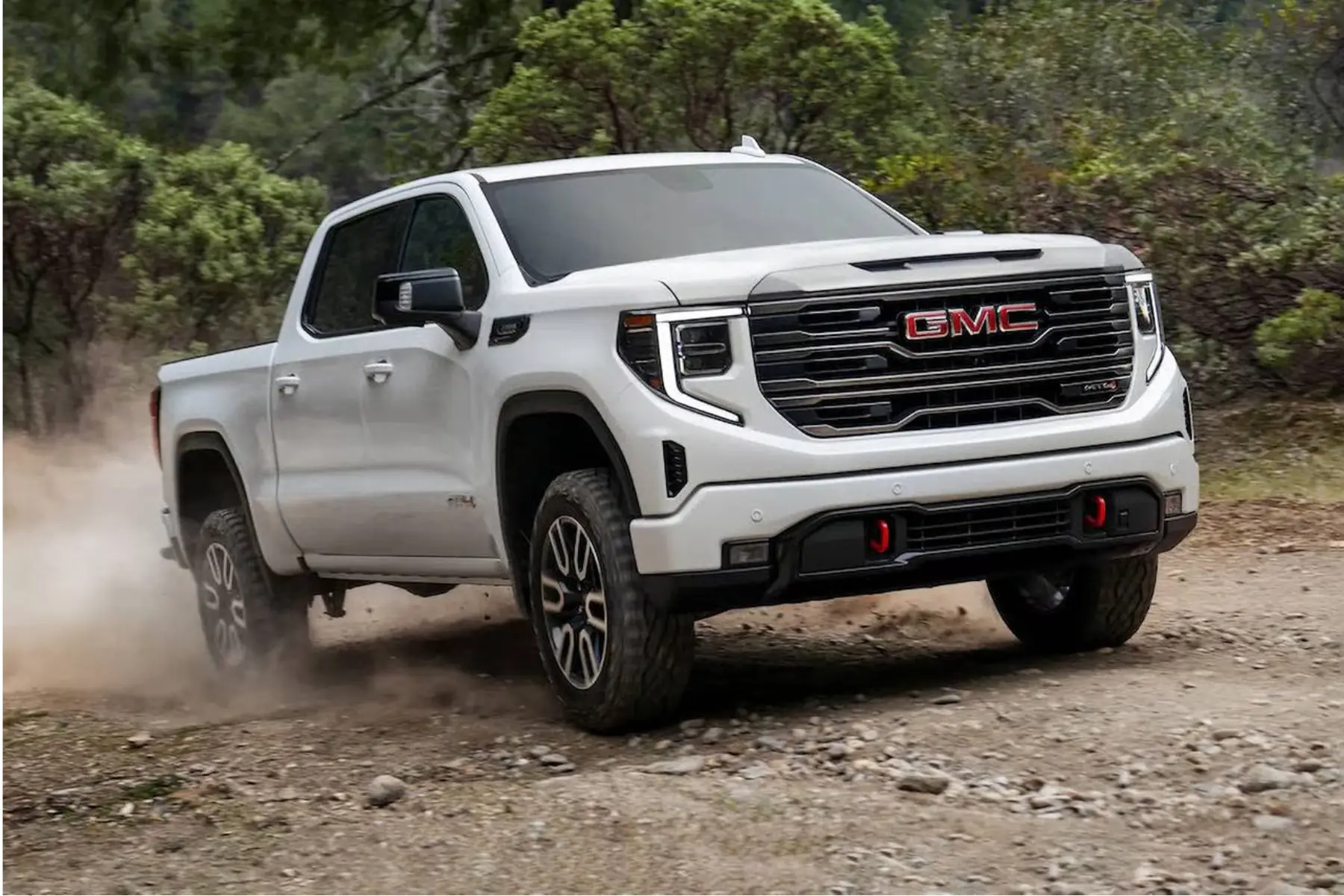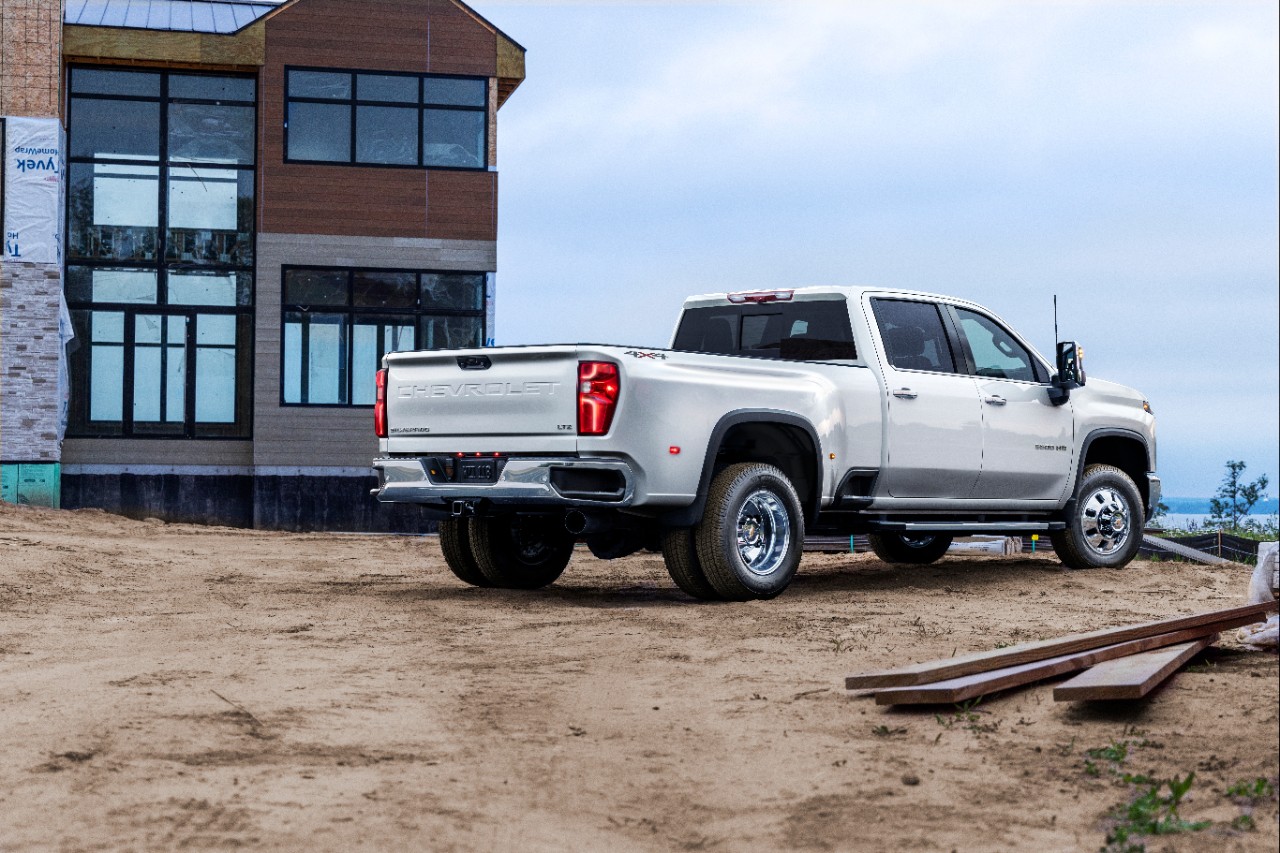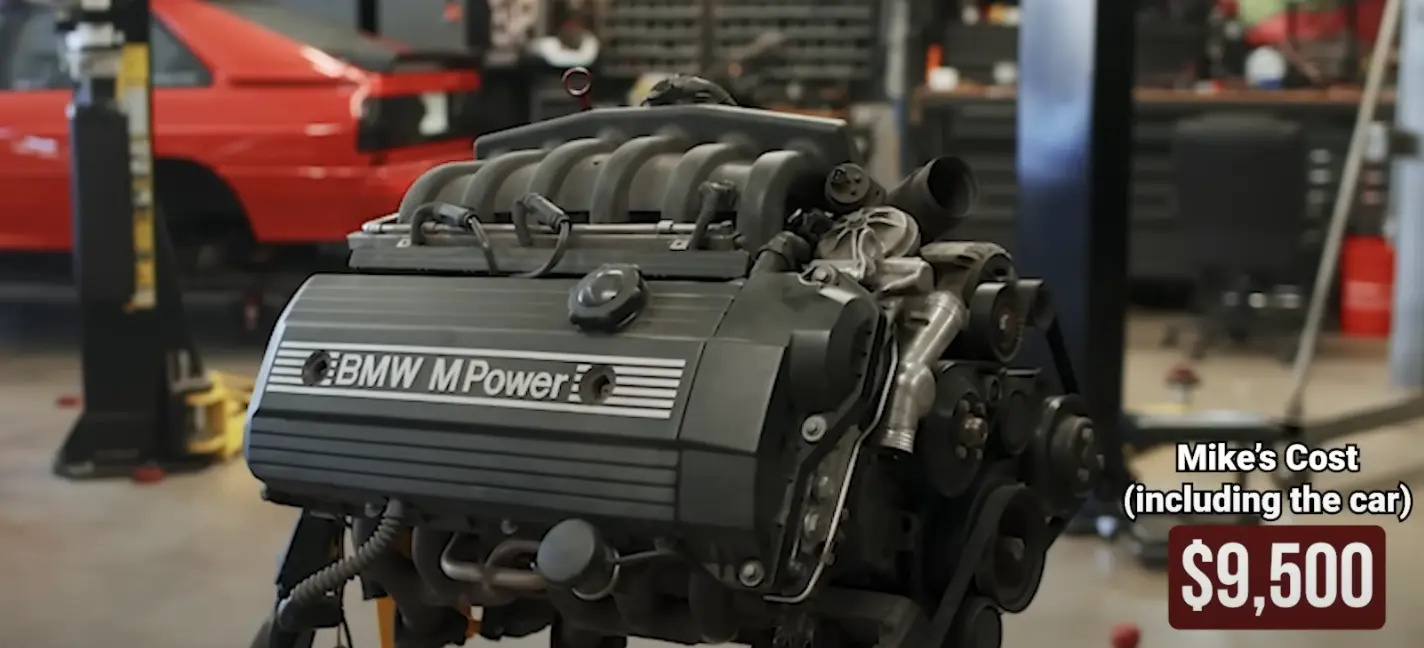“On the Road” is a podcast by JC Whitney, where we explore the stories behind automotive culture and the people who bring it to life. Every other Thursday, we share conversations with builders, innovators, and enthusiasts who live and breathe all things automotive. The following has been edited for length and clarity.
In this episode, Angel Sala-Belen chats with Tony Colombini, founder of Blacktop Media and Blacktop Magazine. Tony shares how his passion for the automotive industry, combined with his expertise in graphic design and marketing, led him to create a platform that celebrates custom culture, hot rods, motorcycles, pinup models, and more. Tony discusses his journey from designing websites in the ’90s to building a thriving online magazine that highlights unique stories from the automotive world.
Angel Sala-Belen: Hello and welcome to JC Whitney On the Road. My name is Angel Sala-Belen, I’m your host, and today we are joined by Tony Colombini. I’ve got you on here as the founder of Blacktop Media and Blacktop Magazine. How’d you get into all of that?
Tony: Well, it’s really more of a passion. I was doing graphic design for a whole bunch of different companies back in the early to mid-’90s. I had a business coach who said, “You should really focus on something you’re passionate about.” I said, “Well, I’m passionate about the automotive industry.” So, I just devoted all my resources to doing work for the automotive industry.
Thinking of a name and how to rebrand my studio, I thought, “Well, we do everything on the blacktop, so let’s call it Blacktop.”
Angel Sala-Belen: When I saw it, Blacktop was synonymous with bringing stuff you might not know about in this culture to the forefront. You highlight a lot of custom car culture, custom motorcycle culture, and tattoo shops. Am I missing anything?
Tony: There’s also custom culture artists, pinup models, and that whole scene—cars, bikes, everything. People like the magazine because it has a little bit of everything. If it was on the dirt, it didn’t belong on the blacktop, so it didn’t go in Blacktop.
Angel Sala-Belen: Your network highlights manufacturers, builders, restorers, lowbrow culture, tattoo shops, classic cars, motorcycles, custom culture, and hot rods. You’ve got 25 years of design and marketing experience. You’ve taught design and brought all of that to your online publication. What do you look for when you’re out and about, finding content for your publication?
Tony: What I look for most is the unique story. We all have stories to tell. When I meet people at car shows, I ask them about their vehicles, and they usually share stories about their family—like how the car belonged to their dad or grandpa. I’m always looking for those personal, unique stories to highlight, whether it’s about a person, a company, or a car.
Angel Sala-Belen: In today’s world, we talk about NPCs—non-player characters. You don’t want to be an NPC. You want to be active, to go out there and play in this game we call life. Your online publication feels like a peek into a welcoming subculture. It says, “This might not be what everyone else is doing, but it’s cool, and you can be part of it.”
Tony: Exactly. We have to differentiate ourselves. The automotive industry is huge. I’ve seen people cover the big publications or the general automotive aesthetic, but I like to dig into custom culture. I focus on hot rods, bikes, and the artists who live their passion creating incredible pieces of work. They might not be considered high art for museums, but they’re fantastic, and it’s fun to share those stories. People really seem to dig it.
Angel Sala-Belen: It’s super cool. I used to work for a guy named Jimmy. He moved to California from Virginia, where I’m from, and he told me about how he stole a motorcycle and gas to ride across the country. He was one of those guys who lived life on the edge.
Tony: And a thief!
Angel Sala-Belen: Yeah, but it’s okay. That story didn’t define him. He was a good guy—just living life out there. I’m sure nobody got hurt.
Tony: Stories like that are inspiring. Back in my 20s, I met people in the restaurant industry who walked across Canada or did similar things. It inspired me and a friend to dream about buying ultralights to fly across the U.S.—we never did, of course. You need money for that. But stories like that stick with you. I want to inspire people, especially younger folks, in the automotive industry.
Angel Sala-Belen: Inspiration is so valuable. Imagine how sad life would be without it.
Tony: We’d be dead.
Angel Sala-Belen: Exactly. It would be pointless.
Tony: That’s why we do a series called Kid Wrencher, which features stories about people who bring their kids, grandkids, nieces, and nephews into the garage or to car shows. It shows the importance of celebrating family and community.
Angel Sala-Belen: Family, friends, community—we’re all here sharing this space. Do you have any stories you’ve covered that stand out the most?
Tony: I’ve covered stories with celebrities in the industry, which get a lot of attention, but I really enjoy the regular stories—the guy building a car, going through struggles. I think I need to share more of my own stories in the magazine. For example, when I was seven, my uncle, who’s only 10 years older than me, painted a ’64 GTO competition orange with black lace stripes in our garage. We weren’t car people, but seeing that was so cool—it inspired me. Other stories that inspire me are those about people who’ve had their cars since high school. Recently, I did a story about a guy who had a ’67 Camaro since high school. It’s a beautiful car—you see it coming down the street with a nice stance, and it’s impressive. When I talked to him, he shared the story behind it, and you’d never have known the history if you hadn’t gone up to him.
Angel Sala-Belen: If you hadn’t gone up and talked to him, it’s just another Camaro.
Tony: Exactly. But when you hear the story, it becomes so much more. That’s what personalization is about—giving a car a history, a connection.
Angel Sala-Belen: I feel like people have lost that connection to cars. It’s become more about just getting from point A to point B.
Tony: That’s the challenge today. Many see cars as just tools, not as expressions of who they are. Personalization is so important, and that’s what I like to cover—how people make their vehicles unique.
Angel Sala-Belen: I can see that, and I appreciate you doing it. So, what’s next for Blacktop Media? What’s next for you?
Tony: Until 2022, we were printing a quarterly issue of Blacktop Magazine. People loved it—they thought it looked beautiful—but paying $10 for a magazine is tough for some. So, I decided to stop printing and shifted focus to a weekly email newsletter instead of the monthly one I had been doing. Since then, our website traffic has tripled. Now, I know what people are most interested in.
Earlier this year, I started something called Motor Minute. I go to car shows, find a car like that ’67 Camaro, and instead of bringing all my cameras, I just use my iPhone. I take photos and videos, record the story, and edit it into a one-minute feature. People love it.
Angel Sala-Belen: I’ve seen a few of those. It feels like you’re taking us into your perspective—your vision of the story behind the car. It’s like experiencing it firsthand. Have you thought about incorporating VR or AR into these stories? That way, people who can’t make it to the car show can still have an immersive experience.
Tony: I love that idea. I’m not one to shy away from technology. I created my first website in 1996—car-shows.com. Back then, it was revolutionary. I remember getting a call from someone in Wisconsin who found the site through a car show announcement. That blew my mind.
Since then, I’ve embraced the web. But even now, there are people hesitant about new tech. For example, in my world of hot rods and custom choppers, electric vehicles (EVs) are seen as the enemy. But I always ask them what they love about their cars. Often, it’s the torque and the feel of hitting the gas. EVs offer that same experience—instant torque and power.
Angel Sala-Belen: We recently had a guest talk about EV hot rodding. At first, I didn’t get it, but after listening, I realized the core principles—personalization and performance—are the same. I think as more people understand that, EV hot rodding will grow.
Tony: I agree. Hot rodding has always been about personalization, whether for aesthetics or performance. Once people get over their initial resistance, I think we’ll see a lot more EV hot rodding.
Angel Sala-Belen: For sure. If our audience wants to stay in touch with Blacktop or reach out to you, where can they go?
Tony: They can visit blacktopmagazine.com. From there, they can access our social media pages. If someone needs help with web or graphic design, I call myself a “fixer” because I get a lot of calls asking me to fix things, and I’m happy to help. You can also find the Blacktop Media Network there.
One thing I haven’t mentioned yet is my son, Billy. He’s a big part of what I do. When he was 18, he was in a truck accident and was paralyzed from the waist down. He’s been amazing to work with—he acts as my editor, telling me what’s cool and what’s not. We’ve even been featured on Garage Dreams, a MotorTrend show from Australia, and it was such a cool experience.
Angel Sala-Belen: That’s incredible. I love hearing about the family involvement. You’re building something special.
Tony: Thanks. We also collaborate with pinup photographers like Mitsy Valenzuela and feature models and historical articles in our magazine. For example, I once wrote about Raymond Loewy, an incredible designer who worked on Studebaker cars, the Exxon logo, and the Nabisco logo. I love including history alongside the hot rods and custom culture.
Angel Sala-Belen: That’s fantastic. Thank you so much, Tony, for sharing your story.
Tony: Thank you. It’s been a pleasure.
Angel Sala-Belen: Absolutely. Until next time!





